A missionary, called to serve for a period of 18 to 24 months as a representative of The Church of Jesus Christ of Latter-day Saints, returns home with well-used clothes, a hole or two in the soles of the shoes and a set of well-studied scriptures.
- Worn missionary shoes
- Richard Gurgel with Church members in the Philippines Tacloban Mission
- Families are forever Elder Gurgel Philippines Tacloban mission
- Richard Gurgel Philippines Tacloban mission
- Mormon missionaries East Central States mission 1943
- Morgan Cox Philippines Manila mission
- Morgan Cox Philippines Manila mission
- Joseph Fielding Smith missionary photo
- Anthony Cannon New Zealand Auckland Mission
- Aleisha Lyons Argentina Buenos Aires North Mission
- Adrielle Herring Mascarene Islands mission photo
- Adrielle Herring Mascarene Islands mission
- Michiru Jones Illinois Chicago North Mission, 1998-1999.
- Mormon missionaries serving in the 1800s
| Temple Square is always beautiful in the springtime. Gardeners work to prepare the ground for General Conference. © 2012 Intellectual Reserve, Inc. All rights reserved. | 1 / 2 |
Returning missionaries carry home a wealth of knowledge and experiences that set the course of their life: firm faith in God; an increased knowledge of the teachings of Jesus Christ and the restored gospel; an exposure to cultural diversity, even when serving in their homeland; a new language competence, possibly with a foreign language, but often with an improvement in their communication skills; an increase in confidence; and an overwhelming love for the people with whom they have served.
Missionaries also acquire abilities to set and reach goals, to gain a sense of responsibility for themselves and others, to concentrate on their educational studies and to build positive relationships with people of varied backgrounds.
The purpose of missionary service is to teach the gospel of Jesus Christ to all who will listen. But the experience of that service, for the individual missionary, becomes a strong foundation for the future, both within the family and the Church and in academic and professional pursuits. Many missionaries credit their full-time service with influencing the direction for the rest of their lives.
Some move on to successful business pursuits; others find usefulness in the service, education or technical fields. Most also continue church and community service, with a focus on family.
By the Numbers
Those members who choose to go on missions for the Church serve on a volunteer basis at their own expense. Some 1.3 million missionaries have returned from service since the first missionaries were called in the 1830s. Of the more than 15 million members of the Church today, more than 976,000 have served a full-time mission. Many of the lay leadership and service roles in local congregations throughout the Church are filled by those returned missionaries, including approximately 70 percent of priesthood leadership roles. With the recent change in age requirements for service, more missionaries, particularly women, are serving, and will benefit their home congregations when they return.
A full 93 percent of the males and 21 percent of the females receiving bachelor’s degrees in the 2011-12 Brigham Young University academic year had served a full-time mission for the Church.
From another perspective, a research study published in 2010 in the book Shield of Faith: The Power of Religion in the Lives of LDS Youth and Young Adults by the BYU Religious Studies Center found that returned missionaries in the United States were likely to be well-educated, responsibly employed and involved in positive family and Church activities.
Some 40 percent of the survey’s respondents were college graduates, as compared to just 18 percent of the individuals in their respective peer groups. Ninety-five percent of the men and 63 percent of the women are gainfully employed, and their family incomes landed above the national average. Nearly 90 percent of those surveyed attend Church worship services regularly and practice personal religious activities (information verified after 17 years following their full-time missionary service).
A Few Glimpses Into the Benefits of Missionary Service
Statistics illustrate the perceived benefits of missionary service, but the real-life stories of individual missionaries punctuate those positive numbers.
Nolan D. Archibald, executive chairman of the Stanley Black and Decker Corporation and father of seven sons and one daughter, credits his missionary experience as a significant primer that set the course of both his Church and professional careers.
“I spent two years at Dixie College (St. George, Utah), two years at Weber State University (Ogden, Utah) and two years at Harvard Business School. My two-year mission training affected my life in a much more positive way than any of the other experiences. My mission transformed my life. It affected my ability to set and follow through on goals. I learned how to be a leader, rubbing shoulders with other missionaries and my mission presidents.”
Archibald voiced a similar sentiment regarding the service of each of his seven sons. “The boys were always good students, but their mission experience gave them a spiritual grounding you can get in few other places. It set the rudder for both their spiritual and academic lives. I remember the return of my son Anthony, who seemed considerably more confident when he arrived home. He replied, ‘I think I am; I recognized who I am and what potential I have in this world.’”
Recognizing individual potential happens to both the missionary and to those they teach.
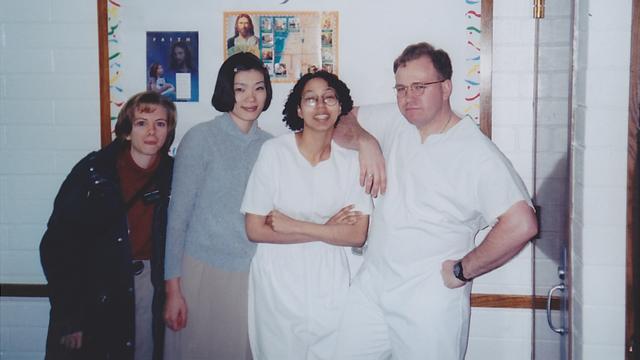
Michiru Jones and her companion join with a recently baptized woman during her missionary service in the Illinois Chicago North Mission, 1998–99.
Michiru Jones, now a young mother of four children who lives in Salt Lake City, was completely surprised by her mission call from her native Japan to serve an English-speaking mission in Chicago, Illinois. “I’d studied English for a number of years, but I really thought I’d be called to a Japanese-speaking mission. I didn’t know if I could handle speaking English 24/7, but I didn’t ever struggle with the language. In fact, it was such a blessing in sharing my personal conversion to Christianity and [the Church]. I think I was much more believable to investigators because I had come so far in changing my beliefs.”
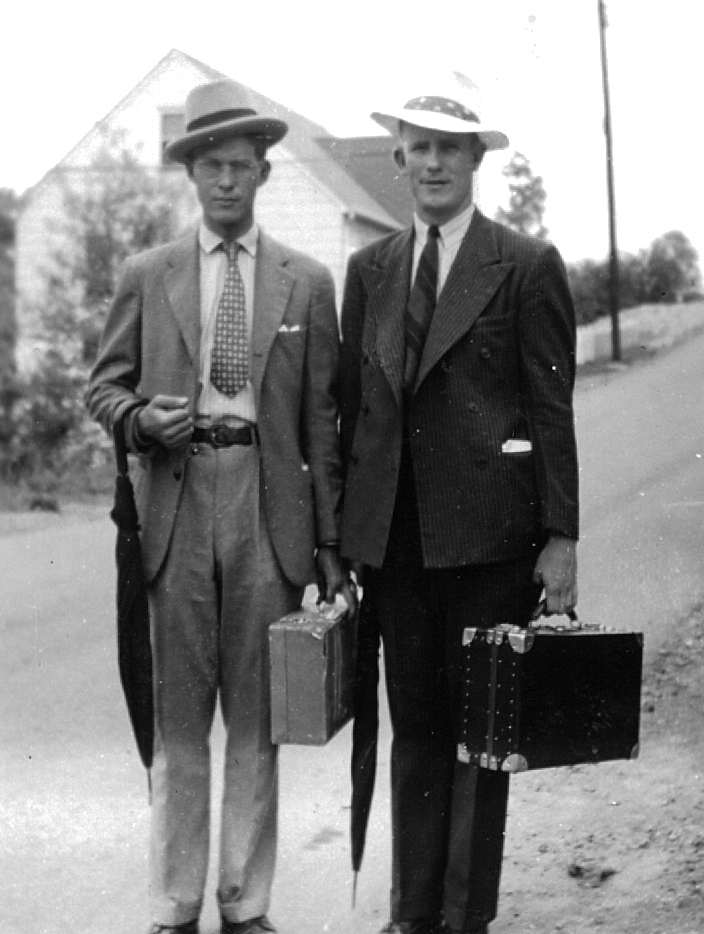
Missionaries in the East Central States Mission, in Bluefield, West Virginia, 1943.
For Erin Enke Hadley, a former vice president with an international public relations firm, the organizational sequence of a mission was critical to her professional success. “In the mission,” the Boston-based mother of three explains, “you had six-week time increments to learn to work together as companions, to resolve issues in your assigned area and to succeed.”
“In the workplace, I always knew that I could manage any challenge for a short time frame, that I could get through anything. In six weeks nearly every challenge finds a solution, even when your success depends on someone else. When you are working together, generally with people not of your personal choice, you are not an island. If there’s a ‘flat tire’ in the group, everyone pitches in to help pick up the pieces to a solution.”
Hadley continues her work in public affairs as a volunteer representative for the Church in the Boston area while she cares for her three preschoolers and supports her husband as he concludes a surgical fellowship. “As I look back on the nearly 15 years since I returned from my mission, I see that it was critical to my life and everything that’s happened to me since. Using those skills — how to study and pray and fast and know that you will get answers — helps you through the difficult things in everyday life.”
Effective missionary service provides a wealth of schooling to the diligent participants: a broadening curriculum that finds space in later religious, academic and professional pursuits.
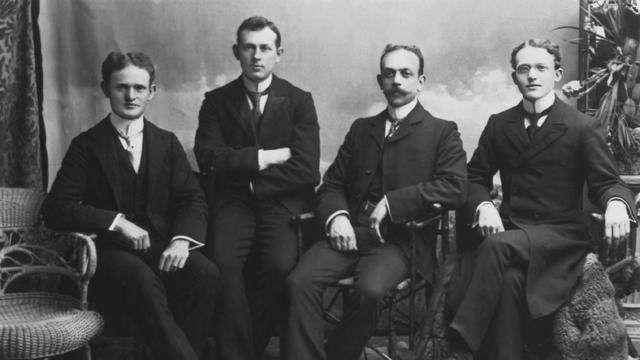
The 10th President of The Church of Jesus Christ of Latter-day Saints, Joseph Fielding Smith, when he served as a missionary in Great Britain, May 1901. Smith is second from the left.
Year after year, Dr. Douglas D. Anderson, dean of the Huntsman School of Business at Utah State University, gathers his top students for a New York City field trip. “Every year we take a group of our outstanding undergraduates to Wall Street and the leading financial service firms,” Anderson says.
“We inevitably hear something like this: ‘What we know about you is that you are hard-working and honest.’ We see it in our missionaries who have found their way to Wall Street. We see it as they complete their years of service to the Church. They come back with greater focus, [a] determination to develop their own skills and talents, having served a purpose larger than themselves.”
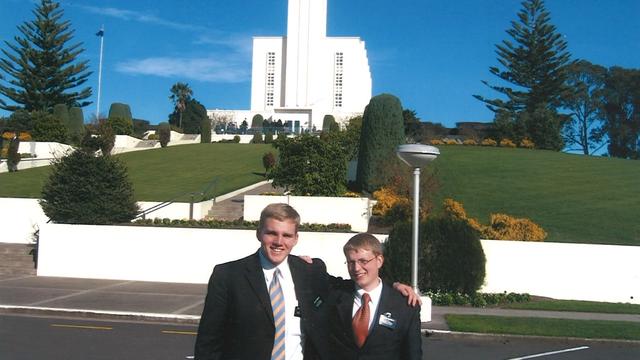
Anthony Cannon and his companion after a visit to the Hamilton New Zealand Temple while serving in the New Zealand Auckland Mission.
Missionary service in New Zealand taught Anthony Cannon from Minneapolis, Minnesota, the ability to look beyond himself in establishing relationships with others. “You get assigned a companion, not of your choosing, and you learn to work with that person, 24/7, to achieve your goals,” Cannon says.
“I once had a new missionary that was so homesick I didn’t think he’d make it through the first six-week assignment. He struggled, I struggled, but day by day, we made it, and he didn’t go home. I felt like I’d given my all to help him through, and then the next six weeks, I had a biking accident, and he had to help me along. We ended up the best of friends.”
Cannon now recognizes how that experience and other similar situations where he had to adjust to individual personality and cultural traits propelled him through his academic work and now in his health care consulting career. “I’ve been able to sort through differences in people to find the common ground we share. Then we are able to build a trusting relationship to move forward on whatever the assignment or challenge.”
For Fanfan Charles, a returned missionary from the Illinois Peoria Mission and a current member of the Brigham Young University track team (featured in The Influence of Missionary Work video above), friendships came before teaching. “A simple smile or a kind word can touch lives and can impact the way people eventually grow closer to God. Being outgoing and friendly, looking people in the eye, helps build a connection that allows you into their lives.
You learn on your mission to be patient, to plan and then to modify that plan as you need to.” Charles continues the strategy as he works through his academic career in Provo, Utah, trying to balance the skill of building continued relationships with the other responsibilities he carries.
Benson Metcalf gained a similar yet slightly varied perspective from his missionary service in the Philippines. “Just four months into my mission I was assigned as the senior companion to a missionary who had been out a year [who] was fluent in the language and an excellent teacher,” Metcalf explains.
“I thought there was a mistake on the part of my mission president, and when I asked him, he replied, ‘Elder, there will be times in your life when you will be placed in leadership positions — in your career and in the Church — and you will have to lead people who are older, more tenured, more experienced, smarter, more talented. Being the leader doesn’t mean you are the best and the smartest. It simply means you need to lead the group and accomplish things together.’”
“That experience helps me today as I, as a business consultant in Perth, Australia, manage some of the smartest people in the world. The challenge is to get out of their way and let the team showcase their talents — a skill I learned through serving in the mission field.”

A long walk through the rural area near the Philippine city of Manila for Morgan Cox and his missionary companion.
For Morgan Cox, a graduate business student at Stanford University, the mission provided multiple lessons in building patience. “Things don’t always go the way you’d like them to as a missionary,” Cox explains. “Going through tough times teaches you patience and an ability to cope with difficult situations. That’s extremely helpful later on as it turns out things don’t always go the way you’d like as a student or a working professional either.”
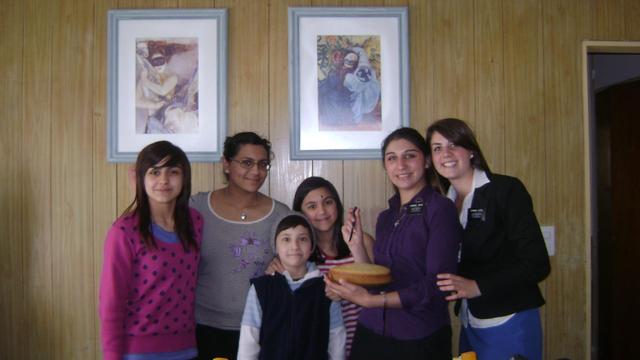
Aleisha Lyons and her companion gather with an Argentinean family during her missionary service to the Argentina Buenos Aires North Mission, 2009-11.
In her service in Argentina, Aleisha Lyons McKean, from Houston, Texas, observed how the leaders of a ward (geographical Church unit) work together. “Now that I’m home, married, and serving in my local ward, I have a longer view of how all the ward responsibilities function in support of one another. I saw that whole picture first on my mission.”
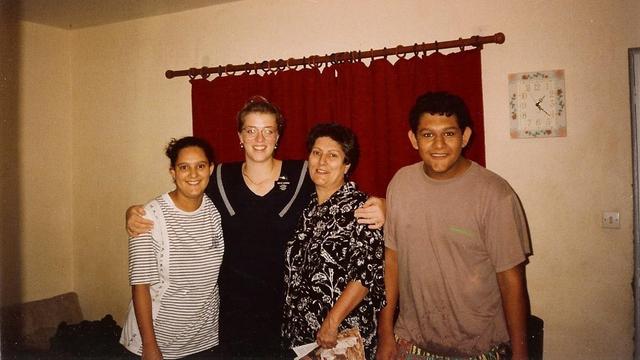
Adrielle Herring meets with a family during her mission to the remote Mascarene Islands.
Adrielle Herring Bowler served her mission almost 20 years ago in the Mascarene Islands, a remote Indian Ocean location east of Africa. Bowler, from Orem, Utah, credits her missionary experience as the “foundation for everything I have done professionally, in the community and with my family.”
Very early in her service, Bowler says she recognized “the hand of the Lord” in guiding her efforts. She learned to be patient and trust in that guidance, a principle she’s implemented as her subsequent career unfolded.
That career took an entirely different path than she had intended, as she obtained a graduate degree in language acquisition and then worked in program development at the missionary training center (MTC) in Provo, Utah. After more than 10 years at the MTC, Bowler is now a stay-at-home mother who works from home on her own schedule.
In that schedule she finds time to be involved in community and political affairs, choosing to make a difference in her neighborhood. “Because of my missionary experiences I am not afraid of anything; I have confidence that I can do anything. A mission may not be the only way to acquire that confidence, but it sure is a fast way.”
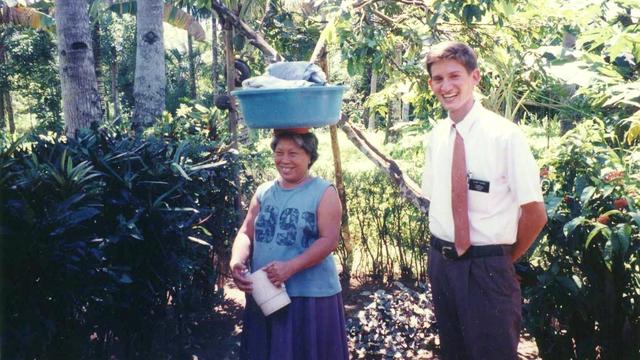
A Church member in the Philippines totes her laundry as she chats with missionary Richard Gurgel.
Richard Gurgel is a Salt Lake City physician whose father and grandfather were both introduced to the Church by missionaries in Germany. He says the most important missionary attribute is the ability to prioritize on a daily basis.
“I served in the Philippines, where people had very little in terms of worldly possessions, yet they were happy and content in their circumstances. In the demanding world I live in now, not a day goes by without recalling the experiences of my mission. Those memories help me strike a balance in my professional and personal responsibilities; [they] help me focus on things that are important eternally, not just in the moment. My family and I have been immeasurably blessed by missionary work.”